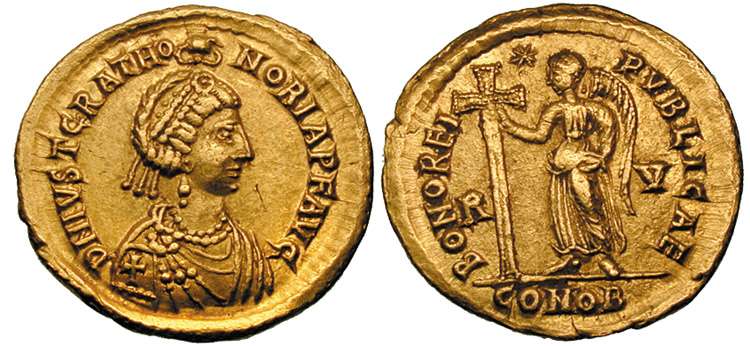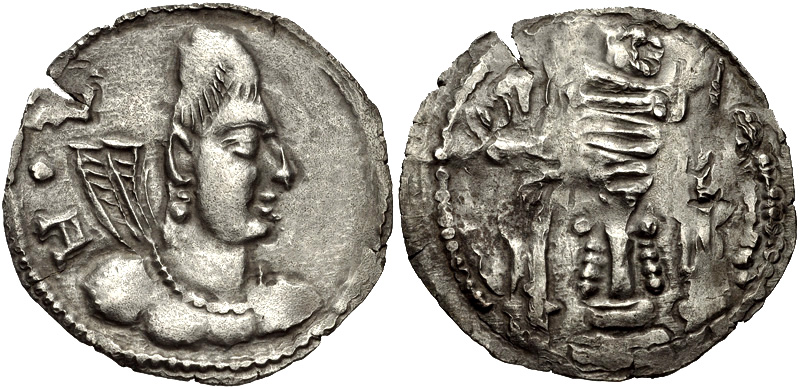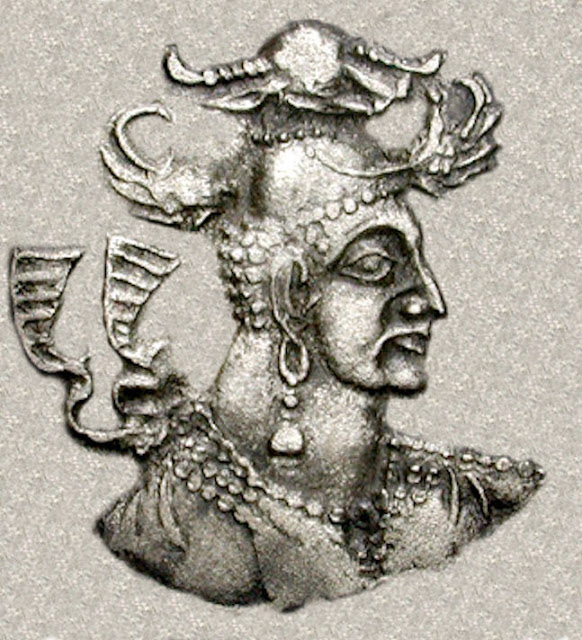Solidus of Roman Empress Honoria 5th C. CE
"At a critical period of European history a princess of the Theodosian house played a brief but conspicuous and outrageous part. Her relations with Attila have secured a scandalous notoriety to the princess Honoria, who would otherwise have been as mere a name to us as her cousins Arcadia and Marina; for her action, if it did not alter the main course of events, determined the Hun king's policy during three critical years. But the true facts of an extraordinarily interesting episode have been obscured, as I hope to prove, by a curious error in one of our sources. Honoria cannot be dismissed as a perverse or romantic schoolgirl, nor, with Mommsen, as 'eine lüderliche Prinzessin.'
Justa Grata Honoria was the daughter of Galla Placidia and Constantius III, and in conjecturing her character we must take into account the qualities she might have inherited from her parents. The youth of Galla Placidia was stormy enough. She was a woman of strong character and will. In her teens she had voted for the execution — it seems to have been very like a legal murder — of her cousin Serena at Rome. Carried into captivity by the Goths, she had wedded the barbarian Athaulf, to the sore displeasure of her brother Honorius; an alliance which at Constantinople was regarded as a gross scandal, a 'decoloration,' as a contemporary said, of the dignity of the Roman state, aggravating the disgrace of the capture of Rome by Alaric. She had borne a son to the Goth, and had been humiliated by his successor. Afterwards her early adventures were forgotten. She ruled over the West with supreme authority for more than a decade, and a chronicler, recording her death and remembering only her ability as a regent and her blameless piety, could speak of her irreprehensible life.
Honoria had inherited the self-will and ambition of her mother, along with the temperament of her father which chafed against conventionality. She had a stronger character than her fainéant brother who was a worthless man of pleasure, and she was naturally conscious of her intellectual superiority. We can understand, too, that, as her nieces grew up and their importance began to overshadow her own, she felt the change from the early days in which she was precious to the state (salus reipublicae), and looked forward with horror to a dull life in which she must always play a minor part. In 449 her discontent issued in action.
The story of her conduct was told by Priscus, the best and most eminent historian of the fifth century, and the most accurately informed on all matters connected with the Huns. We have (1) two fragments from his work, bearing on this episode; we have (2) the story of Honoria's acts in what is certainly a transcription (perhaps almost literal if hardly complete) from his account, by John of Antioch; and (3) two passages of Jordanes which are partly, though not directly, based on his narrative. From these the following story emerges.
Honoria (like the sisters of Theodosius) had a separate establishment of her own, doubtless within the palace precincts at Ravenna, and a steward or comptroller to manage it. The name of this man of business was Eugenius, and with him she had an amorous intrigue. It was discovered. The paramour was put to death, and Honoria was driven from the palace and was betrothed (κατεγγυᾶται) to a certain Herculanus, a highly respectable senator, who was ready to wed a princess of damaged reputation. He has been identified with Flavius Bassus Herculanus who was afterwards consul (425) and therefore must have been a man of wealth. The choice was made because he was esteemed a safe man who could be depended upon to resist if his wife attempted to draw him into ambitious or revolutionary schemes.
The idea of this union was hateful to Honoria, and she sent a trusted servant, a eunuch named Hyacinthus, to Attila, with a sum of money and a ring, requesting his assistance against her brother. Attila eagerly espoused her cause. He claimed her as his bride, and demanded that half of the territory over which Valentinian ruled should be surrendered to her. At the same time he made preparations to invade the western provinces. It seems that he first addressed his demands and threats to Theodosius. It was the spring or summer of 450. Theodosius promptly wrote to his colleague, and apparently advised him to avert the serious danger of a Hun invasion by surrendering Honoria. Valentinian was furious. The details of the treasonable communications with the Hun were extorted from Hyacinthus by torture before he was beheaded. Honoria's life was only spared through the intercessions of her mother. Attila, when he heard of her treatment, sent an embassy to Ravenna to vindicate her: she had done no wrong, she was affianced to him, and he would come to enforce her right to a share of the imperial power. Again when he was about to march to the Rhine at the beginning of 451, he sent a second embassy demanding her surrender, and gave his envoys her ring to show as a proof of the betrothal. It was as her champion that he invaded Italy in the following year, and, when he retreated, he threatened that he would do worse things unless the Augusta and her rightful inheritance were handed over to him. She was therefore alive in 452."
-J.B. Bury, Journal of Roman Studies: Justa Grata Honoria
Source:
https://www.wildwinds.com/coins/ric/honoria/i.html
Quote:



Comments
Post a Comment